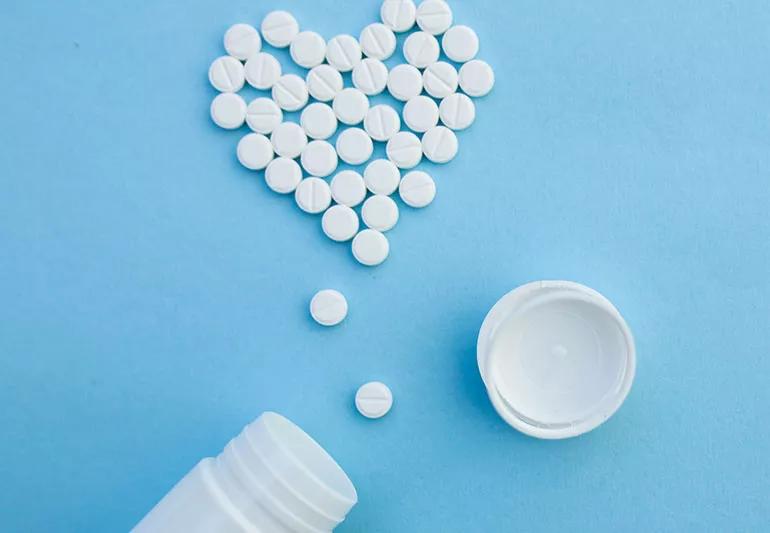The short answer from a cardiologist

Image content: This image is available to view online.
View image online (https://assets.clevelandclinic.org/transform/53c9aded-04c6-467e-b08c-793a33c93dd4/bloodThinnersAspirin-1141209733-770x533-1_jpg)
aspirin placed in the shape of a heart
A: Aspirin is a type of blood thinner called an antiplatelet. Antiplatelets reduce your blood cells’ ability to clump together to form a clot. If you have heart disease, you’re probably familiar with taking a low dose of aspirin to help prevent heart attack.
Advertisement
Cleveland Clinic is a non-profit academic medical center. Advertising on our site helps support our mission. We do not endorse non-Cleveland Clinic products or services. Policy
However, if you have atrial fibrillation and are taking a different kind of blood thinner called an anticoagulant (such as heparin or warfarin) to reduce your risk for blood clots and stroke, it’s critical to talk with your cardiologist if you have an aspirin regimen or are planning to start one.
Sometimes, it’s important for patients to be prescribed aspirin or clopidogrel (Plavix) with anticoagulants such as apixaban (Eliquis), dabigatran etexilate (Pradaxa) or rivaroxaban (Xarelto) to prevent cardiovascular events. In many other cases, though, combining these two types of blood thinners could increase risk for bleeding that outweighs any potential benefit.
As with any medication, you should talk with your doctor about the risks and benefits associated with using aspirin.
— Interventional cardiologist Rishi Puri, MD, PhD
Advertisement

Delivered every Tuesday!
Sign up for our Health Essentials emails for expert guidance on nutrition, fitness, sleep, skin care and more
It's a letter about the news!
Learn more about our editorial process.
Advertisement
Bleeding is a risk and warrants taking care, but the reward of this lifesaving medication is great
The Short Answer from a cardiologist
Most recommended precautions center around minimizing bruising or swelling
Even one drink can have an impact on your cognitive function leading to slurred speech, blurred vision and impaired memory
Understand who may (and may not) benefit
Lorem ipsum dolor sit amet. Et odio Quis vel ipsam omnis eum alias deleniti et placeat impedit non voluptas galisum hic autem enim et cupiditate aliquid. Est beatae quidem non facilis autem ut commodi nisi aut tempore rerum et dolores voluptatem cum enim optio id sapiente quasi. Ad laboriosam officiis 33 cupiditate sequi ea voluptatum consectetur qui necessitatibus voluptate et quasi doloremque et facere explicabo quo explicabo officia
Type 2 diabetes isn’t inevitable with these dietary changes
Applying a hot or cold compress can help with pain
Pump up your iron intake with foods like tuna, tofu and turkey